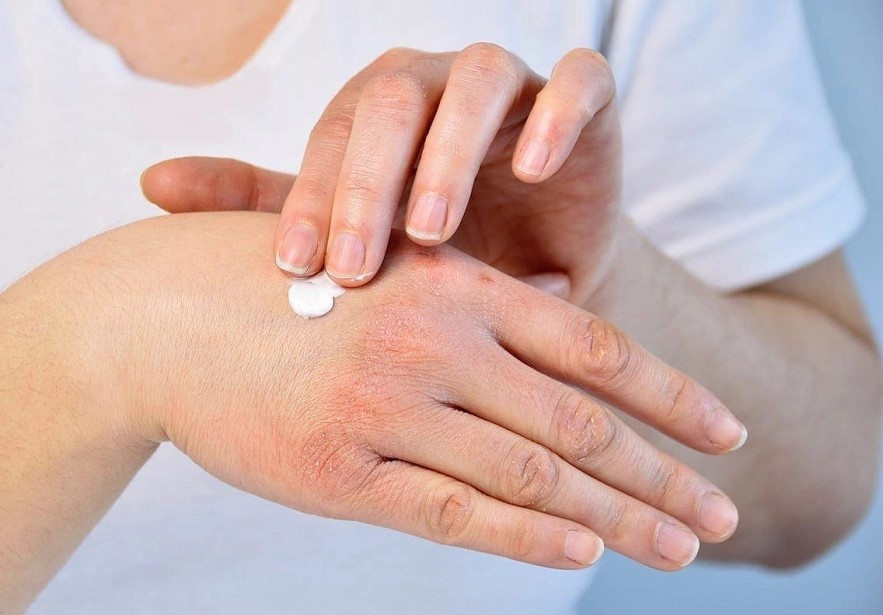Skin Often Dry and Cracked in Winter: How to Prevent
♦ Best Tips to Prevent and Care for Dry Skin in Winter
 |
| Winter skin is often dry and cracked due to lack of moisture. Photo: Verywellhealth. |
Wintertime skin irritations include dryness, itching, and cracking due to the shift in humidity, the cold, dry air, and the habit of washing hands to avoid contracting Covid-19.
In order to maintain its smooth and soft texture, the epidermis, the top layer of skin, typically contains at least 10% water. Less means the skin can't properly exfoliate the outer cells. Cell buildup results in scabs and cracks, which leaves the skin arid, scaly, and occasionally itchy.
Dry skin can affect many people during the winter, and the severity of symptoms can vary. There are many reasons why your skin is prone to dryness and cracking in the winter.
Symptom of Dry Winter Skin
Although it can last a lifetime, dry skin is typically only temporary—for some people, it only occurs in the winter. The severity of dry skin symptoms varies according to age, health, residence, and amount of time spent outside.
Wintertime damage to the skin barrier can result in dry skin, which can cause flaking, scaling, cracking, redness, itching, roughness, sensitivity to touch, and skin discoloration.
Some of these symptoms can appear in a person at the same time. If properly cared for, they will become less severe. Dry skin can affect anyone. However certain individuals are more susceptible to this illness, such as:
-People over 40: The risk increases with age, more than 50% of older adults have dry skin.
-Live in dry, cold or humid climates.
- Working in an environment with a lot of water exposure.
Researchers at Harvard Medical School in the United States state that while dry skin itself is typically not a major health issue, it can lead to complications like bleeding in the cracks and chronic eczema. A secondary bacterial infection (characterized by redness, swelling, and pus) is a more serious complication that may necessitate the use of antibiotics. If you experience any of these symptoms at this time or if your condition does not get better, you should speak with your doctor.
Cause of Dry Winter Skin
Temperature and humidity variations throughout the winter create the ideal environment for dry skin. The epidermis is the outermost layer of skin. The stratum corneum, sometimes referred to as the skin barrier, is the thin outer layer of the epidermis.
The skin barrier is made up of lipids and dead or nearly dead skin cells. The skin barrier creates a barrier that keeps dangerous toxins out of the body. The skin gets dry or irritated when the skin barrier is compromised.
As per Reader's Digest, the wintertime cold air contains less moisture and lipids in the skin barrier compared to the summertime. These variations exacerbate skin irritation and dryness.
Many families make it a habit to turn on the house's heating system in the winter in order to stay warm. Nevertheless, this unintentionally lowers the air's humidity. Additionally, they deplete the skin of its natural hydrating oils, making it more vulnerable to dryness.
In addition, taking baths in excessively hot water during the winter can be detrimental to one's skin. It may cause harm to the skin's surface, which could result in dry skin. Furthermore, using soap with strong detergent qualities aggravates skin.
How to Prevent Dry Winter Skin
 |
| How to Prevent Dry Winter Skin |
Use slightly warm water rather than hot to prevent your skin from drying out. You can also add a few drops of almond or lavender oil to the water to help calm your skin. Additionally, you should limit how long you shower to no more than ten minutes.
Everyone wants to warm up with a hot chocolate or coffee during the chilly winter months. But caffeine, which is found in coffee and chocolate, can cause the skin to become internally parched. Because alcohol is a diuretic and causes dehydration, it can also harm skin. It is crucial that you maintain proper hydration and drink lots of water.
You should have at least one glass of water with every cup of coffee or wine you consume. Even better, you can have a cup of herbal, caffeine-free tea in place of these drinks, like chamomile.
Although wool clothing can keep you very warm, it can also irritate and scratch your skin. Rather, opt for clothing composed of delicate materials like silk or cotton. Wearing a shirt underneath a warm sweater will prevent the wool from rubbing against your skin. When washing clothes and bedding, use mild, fragrance-free, hypoallergenic laundry detergents and stay away from fabric softeners if you have sensitive skin.
Time magazine states that it is imperative to wash your hands for at least 20 seconds, even in the midst of the Covid-19 pandemic. Another way to eliminate bacteria from hands is to use hand sanitizer that has at least 60% alcohol in it. Dermatologists contend that frequent hand washing can actually exacerbate dry skin issues.
According to NYU Langone Health associate professor of dermatology Mary Stevenson, she washes her hands roughly seventy-five times a day. "You only have 20 seconds to complete it. Additionally, the more you wash, the more likely you are to experience dry, chapped skin, particularly in the winter, according to Dr. Mary.
The acid mantle, which is typically the outermost layer of skin, is made up of a thin layer of sebum that is produced by the skin naturally. Here, beneficial bacteria proliferate and serve as a barrier against pathogenic bacteria. However, the skin becomes more prone to dryness and irritation when the acid mantle is compromised, for example, by over-rubbing or using hand sanitizer.
For severely dry skin, your doctor may prescribe a cream containing lactic acid, urea, or corticosteroids. Tests to rule out diseases like hypothyroidism, diabetes, lymphoma, kidney disease, liver disease, psoriasis, and atopic dermatitis may also be prescribed in order to rule out the possibility of dry skin.
 Winter Solstice in 2023: Astrological Forecast of 12 Zodiac Signs Winter Solstice in 2023: Astrological Forecast of 12 Zodiac Signs How will the winter solstice in 2023 starting on December 22, 2022 affect the 12 zodiac signs? |
 Top 10 Most Dangerous States In USA For Winter Driving Top 10 Most Dangerous States In USA For Winter Driving Be careful when you drive in the winter in one of these 10 states in America |
 Top 9 Common Diseases in Winter and Tips to Prevent Top 9 Common Diseases in Winter and Tips to Prevent Winter climate often makes a number of health problems such as asthma, sore throat, joint pain and stomach ulcers… aggravated by low temperatures, cold wind ... |
 How To Get Rid Of A Sore Throat Quickly With The Home Remedies How To Get Rid Of A Sore Throat Quickly With The Home Remedies Do you know how to protect youself from a sore throat during these Winter days? Don't ignore some effective ways mentioned below to avoid and ... |























